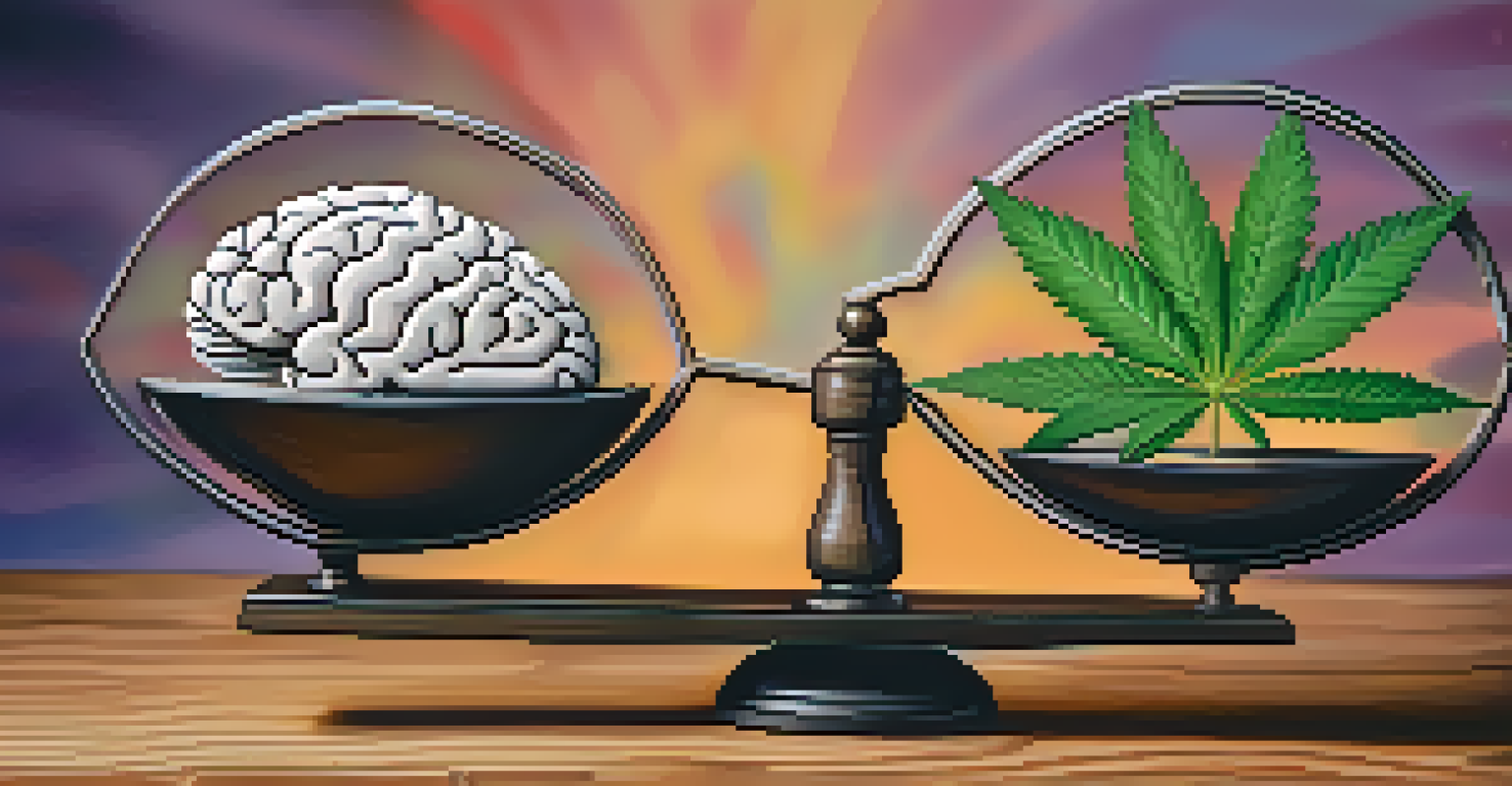Marijuana and Schizophrenia: A Complex Relationship

Understanding Schizophrenia: A Brief Overview
Schizophrenia is a severe mental disorder that affects how a person thinks, feels, and behaves. Individuals with schizophrenia may experience hallucinations, delusions, and disorganized thinking, which can significantly impact their daily life. The onset of this condition typically occurs in late adolescence or early adulthood, although symptoms can vary widely between individuals.
Marijuana can be a double-edged sword; it may provide relief for some but can exacerbate issues for others, particularly those with mental health conditions.
While the exact cause of schizophrenia remains unclear, a combination of genetic, environmental, and neurobiological factors is believed to play a role. Stressful life events and substance use are often cited as potential triggers for those predisposed to the disorder. Understanding these triggers is vital for preventing and managing the condition effectively.
As society becomes more aware of mental health issues, it’s essential to discuss the factors that may exacerbate or alleviate symptoms. One area of growing interest is the relationship between marijuana and schizophrenia, which invites much debate and research.
The Role of Marijuana in Mental Health
Marijuana, particularly its psychoactive component THC (tetrahydrocannabinol), affects the brain's endocannabinoid system, which plays a crucial role in regulating mood, memory, and perception. For some, using marijuana can provide temporary relief from anxiety or stress, leading to its popularity as a recreational substance. However, the effects can vary dramatically from person to person.

While some individuals report improved mood and relaxation when using marijuana, others may experience heightened anxiety or even paranoia. This inconsistency highlights the complexity of its impact on mental health, particularly for those with existing psychiatric conditions. As a result, understanding how marijuana interacts with mental health is crucial for both users and healthcare professionals.
Marijuana's Link to Schizophrenia Risk
Regular marijuana use, especially in adolescents, may increase the likelihood of developing schizophrenia or trigger episodes in those predisposed to the disorder.
In the context of schizophrenia, the effects of marijuana can be particularly concerning. Studies suggest that regular use, especially in those genetically predisposed to the disorder, may increase the risk of developing schizophrenia or trigger episodes in individuals already diagnosed.
Research Findings on Marijuana and Schizophrenia
Numerous studies have explored the association between marijuana use and schizophrenia, with some indicating a potential link. Research has found that individuals who use marijuana regularly, particularly during their teenage years, may have a higher risk of developing schizophrenia later in life. This correlation raises important questions about the safety of marijuana, especially among vulnerable populations.
The link between substance use and mental health disorders is complex, and understanding this relationship is crucial for effective treatment.
Furthermore, some studies suggest that the type of marijuana used may also play a role in this relationship. High-THC strains are often linked to a greater risk of psychotic symptoms compared to those with higher levels of CBD (cannabidiol), which is known for its calming effects. This distinction is vital for understanding how different components of marijuana can affect mental health.
However, it’s essential to note that while correlations exist, causation is not definitively established. Not every marijuana user will develop schizophrenia, and many factors contribute to the disorder, making this a complicated area of research.
The Debate: Does Marijuana Cause Schizophrenia?
The question of whether marijuana use can directly cause schizophrenia is hotly debated among experts. Some argue that marijuana acts as a trigger for those already at risk due to genetic or environmental factors. Others contend that it can exacerbate existing symptoms in individuals with a predisposition to the disorder.
This debate is compounded by the fact that many people with schizophrenia may turn to marijuana to self-medicate, seeking relief from their symptoms. This can create a cycle where marijuana use worsens the condition, leading to more use as a coping mechanism. Understanding this dynamic is crucial for providing effective interventions for those affected.
Nuanced Debate on Marijuana's Effects
Experts remain divided on whether marijuana directly causes schizophrenia, with some viewing it as a trigger for those at risk and others highlighting its potential to exacerbate existing symptoms.
Ultimately, while there is evidence suggesting a link between marijuana and schizophrenia, it is essential to approach the topic with nuance. Each individual’s experience with marijuana can vary significantly, and more research is needed to draw definitive conclusions.
Marijuana's Potential Therapeutic Uses
Interestingly, while marijuana can pose risks, some researchers are investigating its potential therapeutic uses for mental health conditions. Certain compounds in marijuana, particularly CBD, have shown promise in alleviating symptoms of anxiety and psychosis without the psychoactive effects of THC. This opens up new avenues for treatment that could benefit individuals with schizophrenia.
Some studies suggest that CBD may help reduce the severity of psychotic symptoms and improve overall functioning in those diagnosed with schizophrenia. The potential for a non-psychoactive alternative to traditional antipsychotic medications is an exciting development in mental health treatment. However, more comprehensive studies are needed to fully understand its efficacy and safety.
As the conversation around marijuana continues to evolve, it’s important to balance the potential benefits with the risks. Healthcare providers must remain informed about the latest research to guide patients in making informed decisions about marijuana use.
Navigating Marijuana Use for Those at Risk
For individuals with a family history of schizophrenia or those already experiencing mental health issues, navigating marijuana use can be particularly challenging. It’s crucial for these individuals to consult healthcare professionals before using marijuana, as the risks may outweigh the benefits. Open communication with a therapist or psychiatrist can provide valuable insights and guidance.
Establishing a support network can also be beneficial. Friends and family can play a key role in helping individuals make informed decisions about their health and wellness. Encouraging conversations about mental health can reduce stigma and promote a better understanding of the potential effects of marijuana.
CBD's Promise for Mental Health
Some compounds in marijuana, particularly CBD, show potential for therapeutic uses in alleviating symptoms of schizophrenia without the psychoactive effects of THC.
Ultimately, being proactive about mental health is essential. Individuals should prioritize education and awareness regarding the complexities of marijuana use, especially in relation to schizophrenia, to ensure they are making the best choices for their well-being.
Conclusion: A Call for More Research and Awareness
The relationship between marijuana and schizophrenia is undoubtedly complex and multifaceted. As research continues to evolve, it is vital for individuals, healthcare providers, and policymakers to stay informed about the latest findings. The implications of marijuana use on mental health are significant, and understanding them can help guide treatment and prevention strategies.
Increased awareness and open dialogue about the risks associated with marijuana use are crucial, especially for those at higher risk for developing schizophrenia. By fostering an informed community, we can help individuals make educated choices about their mental health and substance use.

Ultimately, as society continues to navigate changing attitudes toward marijuana, prioritizing mental health will remain essential. Encouraging responsible use and further research can help ensure that everyone has access to the best possible resources and support.